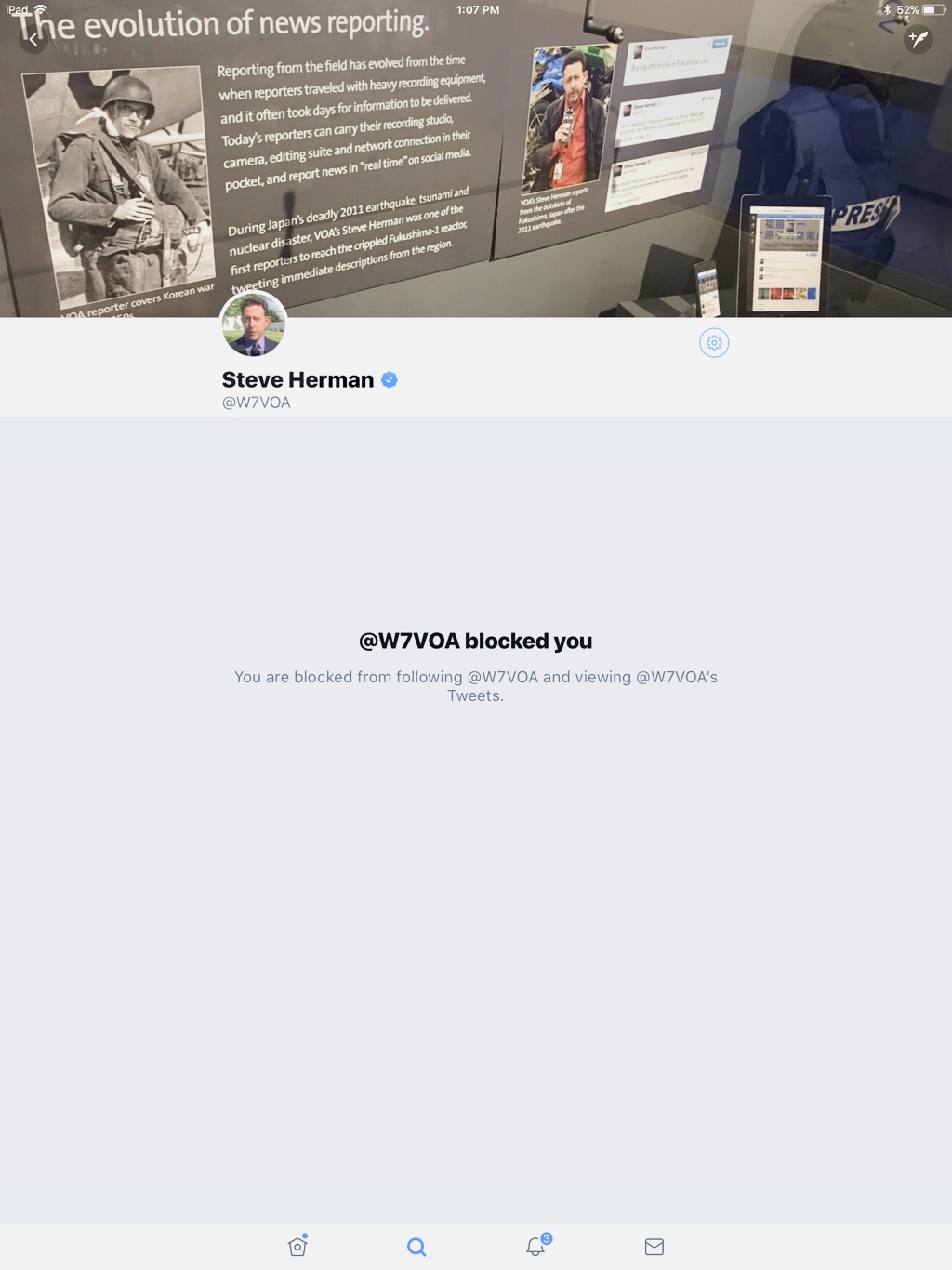BBG – USAGM Watch Guest Commentary
Secret Facebook Pages and Twitter Blockers at USAGM
By BBG – USAGM Watch Contributor
Senior VOA Reporter Was Forced to Reverse Twitter Block of Watchdog Site; Agency Operated or Sanctioned Secret Facebook Groups for Years
In Part One we focused on how a senior Voice of America (VOA) reporter who works as a federal government employee of the U.S. Agency for Global Media (USAGM), previously called the Broadcasting Board of Governors (BBG), was forced to reverse his Twitter block of a watchdog site. In Part Two we focus on how VOA runs secret Facebook groups with the participation of the VOA director.
Part Two
The other recent story involving revelation of the existence of a secret Facebook group populated by current and former employees of Customs and Border Protection, also has parallels to USAGM.
Since roughly the beginning of her tenure as director of VOA in 2016, VOA director Amanda Bennett created, or endorsed creation of, a closed or secret Facebook group, and perhaps others as well.
The difference between Facebook public groups on the one hand, and closed and secret groups on the other, is explained in this excellent article by The Electronic Frontier Foundation.
CLOSED AND SECRET GROUPS: ACCOUNTABILITY?
Closed groups are publicly visible and may show up in searches. Secret groups, however, are not publicly visible.
For Facebook groups that have current as well as former federal employees as members, some questions arise — as they did regarding the case of the USAGM/VOA reporter who attempted to block a U.S. citizen-journalist and a U.S. watchdog website from viewing his Twitter feed.
For one: is material (comments, photos, memes, etc) appearing in the digital space of a closed or secret Facebook group, put there by current federal employees in their official capacities during working hours at taxpayers’ expense, subject to record-keeping requirements?
Would such material — which might include, for example, remarks critical of the president or his policies, remarks critical of other U.S. politicians of any party, or content that appears to favor one gender over another in federal service — be subject to scrutiny via Freedom of Information Act requests?
If the operator or operators of secret or closed groups are federal employees, can they decline a private citizen’s request to join? If so, on what grounds?
Of three closed groups that were operating and related to Voice of America, one called “VOA Director Chat” appears to have been initiated by the media outlet’s director, Amanda Bennett.
By 2019, a source at USAGM said this closed group had been moved behind the internal firewall, using an enterprise version of Facebook known as “Workplace” functioning in tandem with a Microsoft Office 365 system.
Workplace is described as “completely separate product from personal Facebook” and as an internal agency explanation noted, “nothing you share in your Workplace experience will show up in your personal Facebook experience”
STATUS OF MATERIAL ON GROUP UNCLEAR
It is currently unclear whether the VOA Director group and numerous posts since 2016 still exists as a digital entity on non-corporate Facebook, and whether as mentioned earlier they would be subject to FOIA requests.
For much of the time it existed, sources who described themselves as being concerned about the agency’s internal information process provided BBG-USAGM Watch with some information about what was being posted in the closed “VOA Director Chat” group.
It was used to promote the VOA director’s activities, including foreign travel, as well as her priorities and policy pronouncements, including those in which she responded to external criticism, and to pass on praise of agency employees.
During the VOA director’s tour of African countries, the Facebook page was used to promote her activities at every stop, including videos posted by a camera operator accompanying her.
Another closed Facebook group called “The Cohen Network” served as more of a platform for employees, but at times included intense discussion about agency issues, including outside criticisms, such as reporting by BBG-USAGM Watch.
A third group, called “VOA Women’s Caucus” was started in 2019. As the name implies, its purpose was to lend added traction to efforts to boost female visibility and upward mobility at Voice of America.
Since coming to VOA in 2016, Bennett relied heavily on two managers, including deputy director Sandy Sugawara, and longtime agency official Kelu Chao (they often appeared with Bennett at agency “Town Hall” meetings).
The creation of a women’s group led to accusations of gender bias — voiced by some of the agency employees.
One post that appeared on the “Women’s Caucus” page, a promotion for a guest speaker, contained a not-so-tongue-in-cheek jab at President Trump’s claims about crowd size at his inauguration.
Among posts appearing on The Cohen Network page was one by Andre Mendes, a former executive who was accused by unidentified agency officials in 2018 of attempting to stage a “coup” aimed at installing pro-Trump managers in what one article at the time called the potential “Breitbartization” of U.S.-funded global media.
Mendes resigned in 2018 to take a job at the Department of Commerce. He was quoted by The Miami Herald as categorically denying the charge.
BBG-USAGM Watch reported on this in 2018, noting that there was never any substantiation of the “coup attempt” claim, which was picked up by, among others, Representative Elliot Engel (D-NY).
The point here is that all of these Facebook groups, including the one created at the request of the VOA director herself, contained information that could be considered of value by journalists seeking to write factually about the agency.
As the New York Times reported recently, USAGM has been shaken by scandals under its existing management. CEO John Lansing was appointed by the former BBG board under President Barack Obama. Bennett is also an Obama-era appointee.
The agency which claims to support press freedom also is not known, and this is an understatement, to be easily cooperative when it comes to inquiries from outside journalists.
USAGM stonewalled for months in response to questions and a FOIA request from BBG-USAGM Watch about Haroon Ullah, Lansing’s former top aide whom he hired and promoted rapidly to occupy two major positions only to fall suddenly after Ullah admitted to forgery and stealing government funds.
The agency has also delayed for months on responses to a number of other FOIA requests.
The existence of the closed or secret Facebook groups under Voice of America does not necessarily mean that they were being used to post the kind of harsh material seen on the group linked to CBP.
Nevertheless, there is an obvious parallel when it comes to the broader discussion of information existing in digital spaces that are either sponsored directly by a federal agency and the senior officials running it or sanctioned by them.
Potential exists for such groups being used by management of a federal agency to help rally employees against what managers might claim is unjust criticism from outside, and to strengthen management’s influence over and control of debate.
That’s a scary prospect — perhaps members of Congress will look into the closed/secret Facebook groups of USAGM, the existence of which was undoubtedly hidden from lawmakers on Capitol Hill.
BBG-USAGM Watch contacted USAGM asking the following questions about the Facebook groups:
(1) Who among VOA executives initiated the groups or asked that they be created?
(2) Have posts, photos, videos, etc from all 3 groups been preserved for purposes of federal record-keeping?
(3) If any or all of the groups have been taken off regular Facebook and put behind the agency’s firewall, when was that done and why?
(4) What agency official or officials were given responsibility for monitoring content and managing these groups?
(5) How does VOA Director Bennett justify the existence of such secret/closed Facebook groups — and are the public and employees who could not access these secret groups disadvantaged in any way?
(6) Do managers and employees post to these groups on government time?
As of the time of publication, the agency had not responded to any of these questions.
Read in Part I About Blocking of U.S. Journalists on Twitter By VOA U.S. Government Employee-Reporter
The author of this guest commentary, who is both as a reporter and a commentator, does not wish to be identified out of concern for protecting news sources. The author is solely responsible for all personal opinions and reporting for this article.

